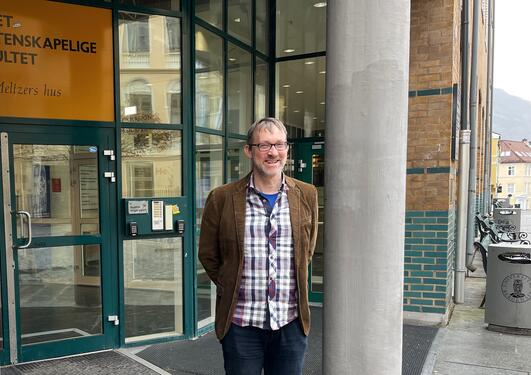Setting out to build a new research field
Aaron Spitzer’s ERC project, CONFRONT, has started. Over a period of five years, the project will explore arising conflicts between settlers and indigenous peoples.

Main content
The project, which in full is called “Contested frontiers: Understanding the metapolitics of settler-state peripheries (CONFRONT),” started May 1st, 2024. It is funded by an ERC Starting Grant.
The CONFRONT project aims to develop a theory of frontier constitutional politics. The focus is on places like Finnmark in Norway, the Arctic territories of Canada, the tropics of Australia, and the overseas islands of the United States, France, Denmark, and so forth.
– I call these places “contested frontiers,” because there, Indigenous peoples (Sami, Inuit, Pacific Islanders, etc.) are seeking to assert, or re-assert, political authority, says associate professor at the Department of Comparative Politics, Aaron Spitzer, leader of the project.
These frontiers are increasingly becoming torn between “us” and “them,” “theirs” and “ours.” They are subject to power struggles between settlers, whose force has been constrained, and resurging Indigenous groups. The project seeks to explore and understand these frontiers and the constitutional-political contests connected to them.
Why is it important to study/explore this?
– It’s important to the people who live in these places, of course. Their political future hangs in the balance. Will Guam or New Caledonia or Greenland become independent countries, controlled by local Indigenous majorities? Or will they remain colonies? Do the Sami own the lands of Inner Finnmark (as is being contemplated right now by the Norwegian Supreme Court)? Can I, as a U.S. citizen, move to, vote, or run for office in American Samoa or the Marianas islands, or are those rights reserved to Indigenous islanders?, Spitzer answers.
– But these questions are also important for understanding modern liberal democracy more generally. How do liberal democracies – which espouse allegedly “neutral” principles of universalism and egalitarianism – grapple with Indigenous peoples’ demands for group-differentiated status? How do we navigate clashes between those we consider to be “we the people” and those who deem themselves “others”? How do we clarify the line between the “domestic” and the “foreign,” “ours” and “theirs,” “us” and “them”?
What is your goal with the project?
– Because the clashes I study occur on “geographic peripheries,” they are often overlooked by political scientists. And, when they do get attention, they are examined in national isolation: American scholars look at American islands, Norwegian scholars study Finnmark, and so forth. So my goal in part is to shine light on these conflicts individually, as well as to explore their commonalities collectively.
– More than that, though, I hope to develop tools (intellectual, legal) for resolving these clashes. Right now, academic and legal scholars are well-equipped to grapple with conflicts that are purely domestic, taking place among “us.” And we have pretty good resources for navigating conflicts between the domestic “us” and the foreign “them” – for example, between Norway and Sweden. What we lack, and increasingly need, are ways to resolve clashes concerning what might be called “constitutionally prior” dilemmas, over who is domestic versus foreign in the first place.
What is the plan moving forward?
– The project started May 1st and runs for the next five years. Right now I’m in the process of hiring help – a postdoc and two PhD students, and some M.A.-level research assistants, who hopefully will bring skills that I lack, in the fields of normative political theory, constitutional law, and comparative politics. The goal is to have the team in place by the autumn and to have a kick-off conference in Bergen in early 2025, bringing in scholars with related interests – experts in U.S. “Indian Law,” specialists in political theory’s “democratic boundary problem,” etc. Then we begin data-gathering, comparative analysis, and normative and constitutional theorizing. I basically will be splitting my time between Bergen and “the field,” mostly in the Canadian Arctic. By the end of all this we hopefully will have carved out a new field, bringing these fuzzy, peculiar dilemmas into focus and providing practical solutions.
The project started yesterday (May 1st). How is to finally have started?
– Hahaha! Scary and amazing. It’s like preparing to descend for the first time into a vast unexplored cave system – intellectual spelunking. You have a headlamp, and some basic ropes and tools, and some rudimentary experience. And then you take a deep breath and head underground, preparing to grope through the darkness, hopefully with the skills to solve any challenges that arise, and grateful for the opportunity to try to map a place that is fascinating and utterly unknown.

